Meet Our April Cover Star, Tatiana Maslany!
Tatiana Maslany, the ass‑kicking, shape‑shifting star of Orphan Black, is one of the most versatile actors of her generation. (She plays eight characters in one show!) Rachel Heinrichs talks to the woman behind the many masks
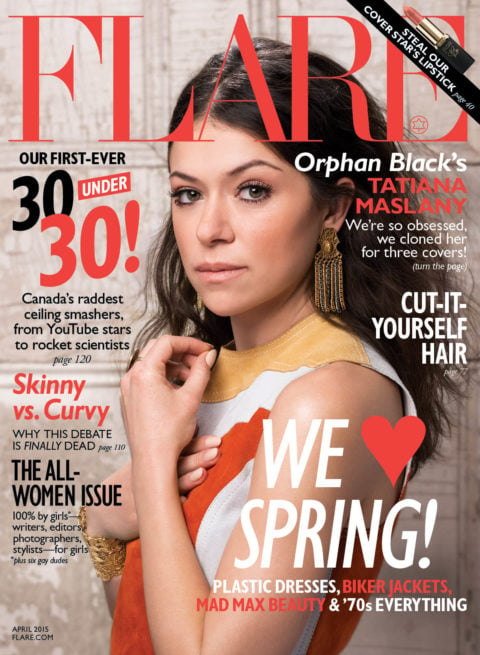
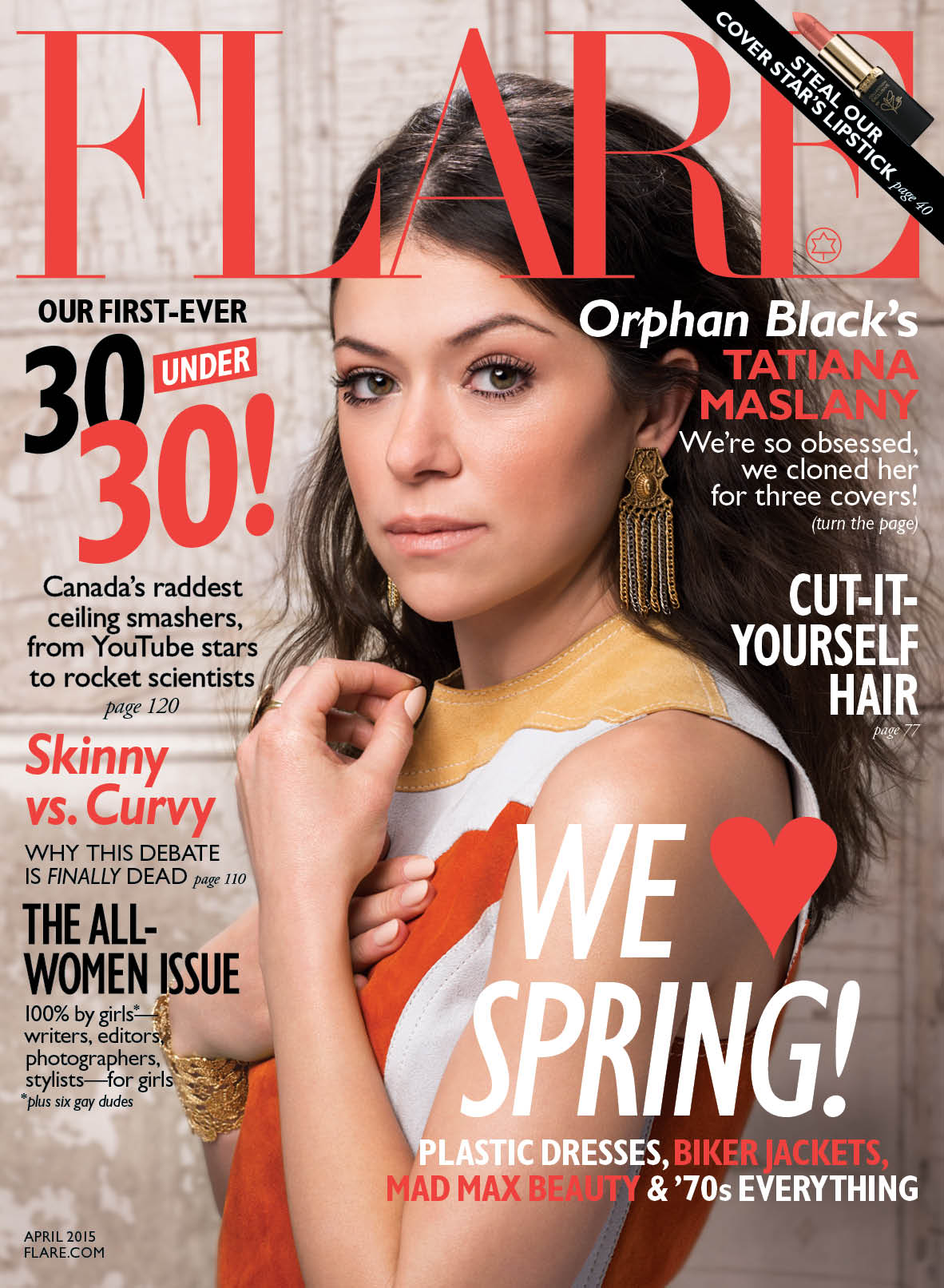
In the pilot of cultishly loved Canadian sci-fi series Orphan Black, a mouthy street thief in a leather jacket and combat boots stands on a train platform. She sees another woman in a prim bun and a power suit, weeping. As she approaches, the crying one slips out of her heels, neatly folds her blazer and slowly turns to face her onlooker. They’re identical, though one is hardened, the other hopeless. Their split second of recognition ends when the sorrowful lady steps off the platform and into an oncoming train. Both characters are played by the mesmerizing 29‑year-old Tatiana Maslany, who, over the course of the show’s two-season run (season three premieres April 18 on Space), plays six other clones bioengineered by a sinister corporation that plants them in vastly different environments as a twisted nature-versus-nurture experiment.
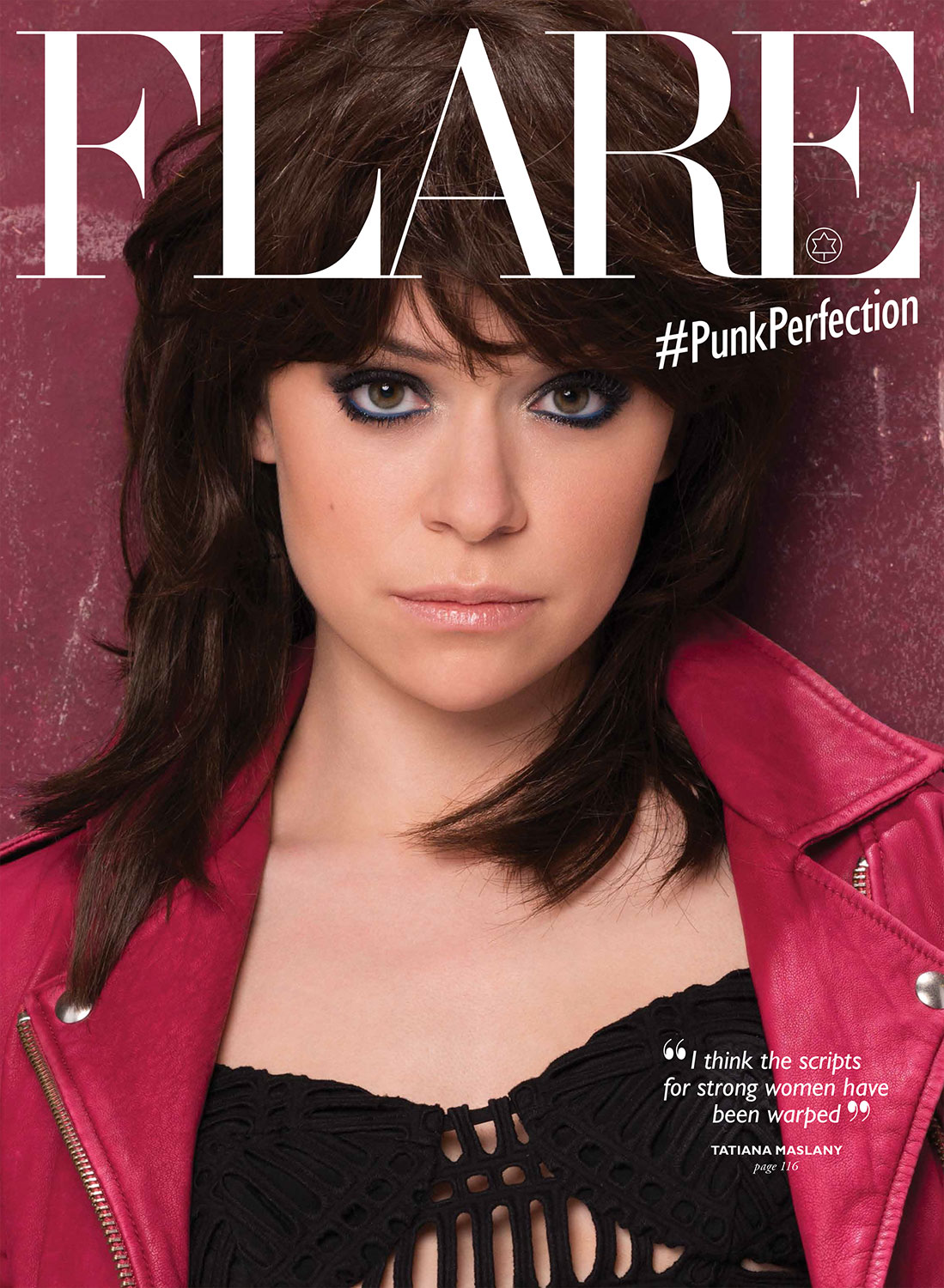
The street tough is Sarah, a cockney-accented con artist who can lie or seduce her way out of any bind; the train jumper is Beth, a Toronto cop with depression issues. Then there’s Cosima, a raver‑ish queer grad student from Berkeley; Rachel, an icy British exec; Katja, a Eurotrash German spy type; Allison, a tightly wound suburban soccer mom; Helena, an animalistic Ukrainian psycho-killer; and, finally, Tony, a transgender ex-con with a mullet and a soul patch. If all that doesn’t sound bonkers enough, Maslany also frequently plays one clone pretending to be another. (“Playing Sarah playing Cosima was a brain f‑ck,” she says.) And, through digital razzle-dazzle, she plays opposite herself in many scenes in which the clones bond, brawl and scheme. Even more impressive is the depth Maslany brings to each character. Her clones are never cartoonish sci-fi/fantasy heroines (hey, Buffy) or broad stereotypes, though they easily could be: a soccer mom, a boss bitch, a granola lesbian. All eight have inner lives and contradictions; all eight are completely believable women. Her prodigious performance has turned the Toronto-made production, which may otherwise have been dismissed as sci-fi CanCon nerdery for teenage boys, into one of the most wildly entertaining and feminist shows on television. Think of current hits like How to Get Away With Murder, The Good Wife and Girls, which are routinely lauded for their complex female leads, then multiply those characters by eight, and you have some sense of the show’s—and Maslany’s—achievement.
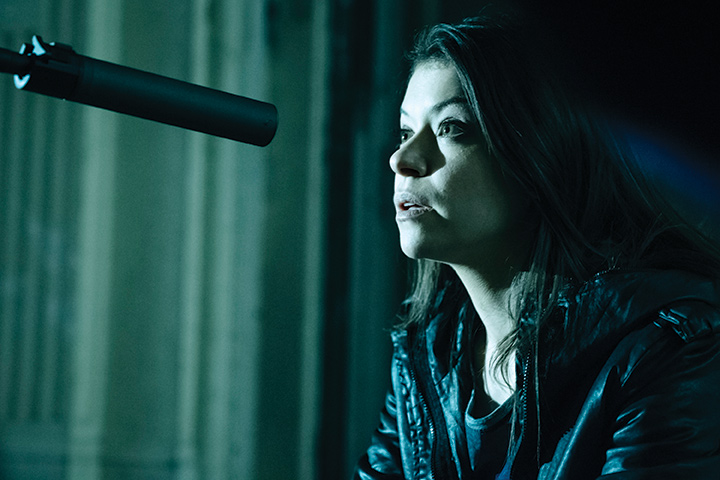
Since its premiere in 2013, Orphan Black has become one of the rare Canadian shows to net a massive international audience: it airs in over 170 countries, and more than three million viewers (not to mention countless downloaders) tuned into season two. But a more visceral measure of the show’s success is the fervency of its fans, who call themselves #Clonebians or #CloneClub. They live-tweet every episode, craft clone dolls, manicure the characters onto their fingernails and queue up by the hundreds to see Maslany, like when the Orphan Black cast appeared last year at Comic‑Con, the international gathering of genre fanatics in San Diego—one admirer even wept while thanking her and co-star Jordan Gavaris (who plays Sarah’s gay foster brother) for representing fully rounded LGBTQ characters on television.
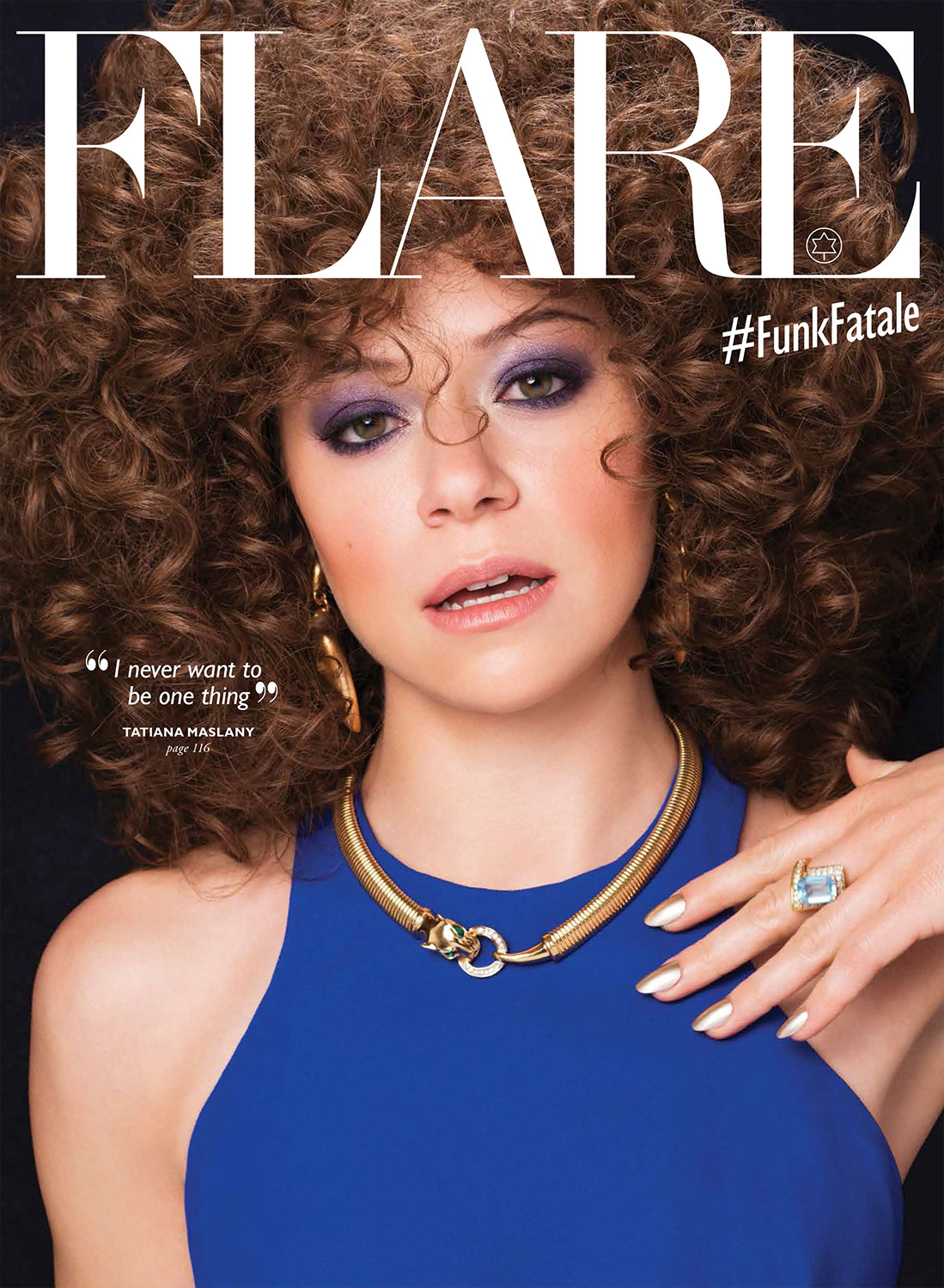
Critics and TV insiders, too, uncustomarily lose their minds over Maslany. In 2013, when the Emmy nominees were announced and her name wasn’t on the list, Variety, The Hollywood Reporter and Entertainment Weekly decried the oversight, which is now known among fans as the snub heard round the Internet. Twitter erupted in a campaign to nominate her (#EmmyForMaslany), turning her name into a global trending topic. Since then, the actor has been nominated for a Golden Globe and a Screen Actors Guild Award, won two consecutive Critics’ Choice Awards for Best Actress in a Drama Series and taken the Best Actress in a Drama Series prize at the Canadian Screen Awards twice. She’s also landed her first major movie role in the drama Woman in Gold (April 1), with Ryan Reynolds and Helen Mirren.
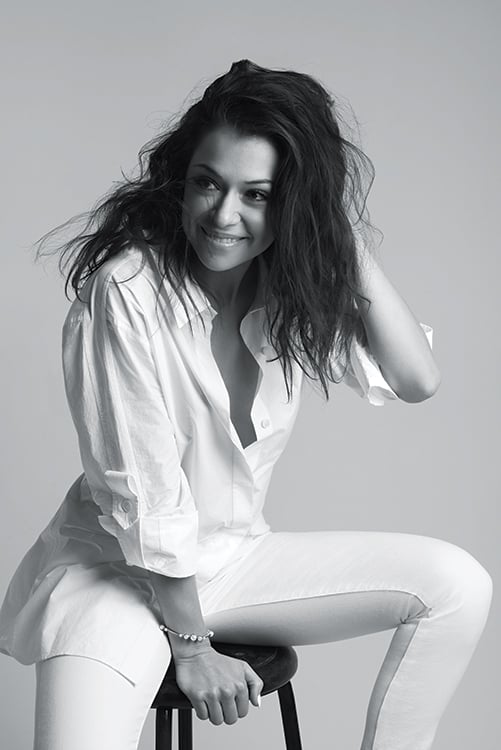
Part of Maslany’s magnetism lies in the fact that she disappears so thoroughly into her characters’ wigs and accents that it’s hard to get a handle on the woman behind them. And, unlike her contemporaries, she hasn’t leveraged her personality as part of her brand—there’s no Lena Dunham–style tell-all or blog about what she buys à la Mindy Kaling. The bio line on her rarely updated Twitter profile simply reads “Acting. Brisket.” The most personal pic she’s ever posted is of her and her boyfriend, dashing Downton Abbey actor Tom Cullen, looking googly-eyed at each other on the SAG red carpet this year. She’s one of the few young actresses today known entirely for her work, not her celebrity.
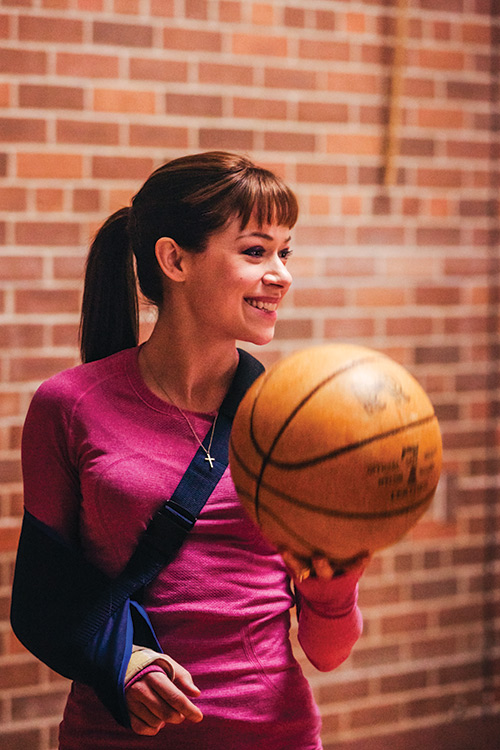
It’s unnerving, then, to hear her true Saskatchewan-bred voice on my phone the afternoon we are to meet for an interview: “Hey, it’s Tatiana.” The call is just a heads-up to change the lunch location. No big deal. Yet I’m disarmed by the old-time normalcy of using my phone as a phone, instead of having someone else email on her behalf, as is the norm in the world of celebrity interviews. Likewise, when I visit the east-Toronto set of Orphan Black a week after our first meeting, Maslany squeezes my shoulder as she whizzes by, unrecognizable in Allison’s L. L. Bean uniform, and asks how I’m doing, like we’re old friends. The real Maslany—or Tat as everyone calls her—is, well, winningly real.
That grounded quality likely comes from her upbringing in Regina, which she recalls as “a typical prairie thing.” She tells me this over a skillet of eggs baked with prosciutto and ricotta when we meet for lunch in Toronto’s King West neighbourhood. In the middle of filming the show’s third season, Maslany must be exhausted, yet she radiates an unusual combination of super-alert energy and chilled-out comfort. (She’s wearing an Adidas sweatshirt, jeans and winter boots, which, for the fashion record, are a notch dressier than the plaid onesie, complete with butt flap, she says she wears on her days off.) Her pale face is fresh, and her eyes, rimmed with brown liner, are so huge and black, she looks like a Big Eyes painting.
Maslany’s mother is a translator—one of the reasons she speaks French, German and Spanish, and performs her accents so flawlessly—and her father is a woodworker. After a childhood of dance and school plays, her path was clear come adolescence, when she started taking small acting gigs in Vancouver, Edmonton and Winnipeg: “I was done with high school as soon as it started. I didn’t understand what I was doing there, because I was working at the same time. I was just a wandering dork, quietly moving through school, kind of committed to it, kind of not.”
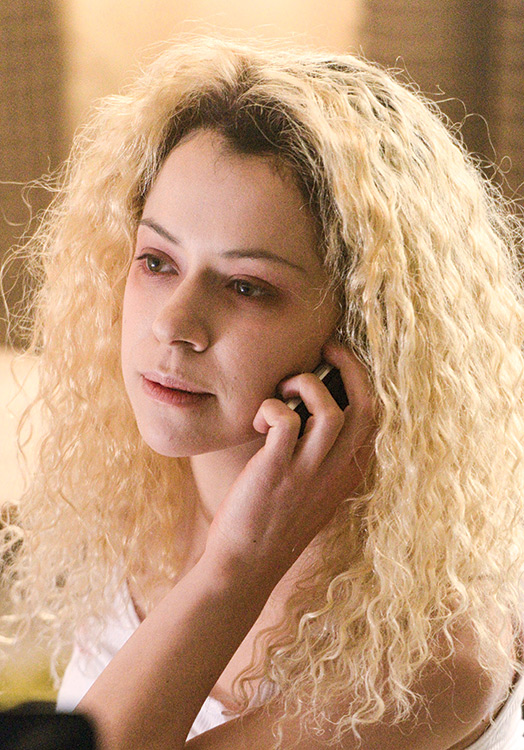
After graduation, she skipped university and toured with the Regina-based improv troupe General Fools for seven years, then moved to Toronto in 2005 to give screen acting a real shot. “It was horrible,” she says of the move. “I cried all the time from the shock of being alone in my apartment with only two pieces of Ikea furniture.” She landed her first feature-length movie role as a braces-faced kid in the campy 2004 werewolf horror sequel Ginger Snaps 2: Unleashed, executive produced by John Fawcett, the co‑creator of Orphan Black. “It was a little psycho 14-year-old-girl role,” says Fawcett, “and it was down to her and Ellen Page. No one knew who Ellen Page was either, at the time, and Ellen and Tat were about the same level, but Tat won the day. Her version of the character was just so out there and so quirky.”
Fawcett’s comparison to the naturalistic Juno star is apt, especially looking back on Maslany’s pre–Orphan Black turns as darkly funny, troubled teens. First in Grown Up Movie Star, a moody Newfoundland indie that earned her the World Cinema Special Jury Prize for Breakout Dramatic Performance at the Sundance Film Festival in 2010. Then in Picture Day, an underrated 2012 Canadian dramedy, in which Maslany delivers a performance so true to the nonchalant gestures and idioms of teen life, I ask if it was improvised. It wasn’t. She just makes it look that way.
In 2013, when Fawcett and his co-creator, Graeme Manson, were looking for an actor to play their leading ladies, they brought in Maslany for a lightning-round-style audition, making her run through clones on command. Maslany didn’t flinch. Fawcett remembers her callback: “The network was going to be there. It was a big deal. She showed up in the morning all sweaty on Rollerblades. She has all this natural confidence and energy that’s not normal. Not to a callback. Everyone’s so tense, but she’s so loose and comfortable, and doesn’t let the pressure get to her.”
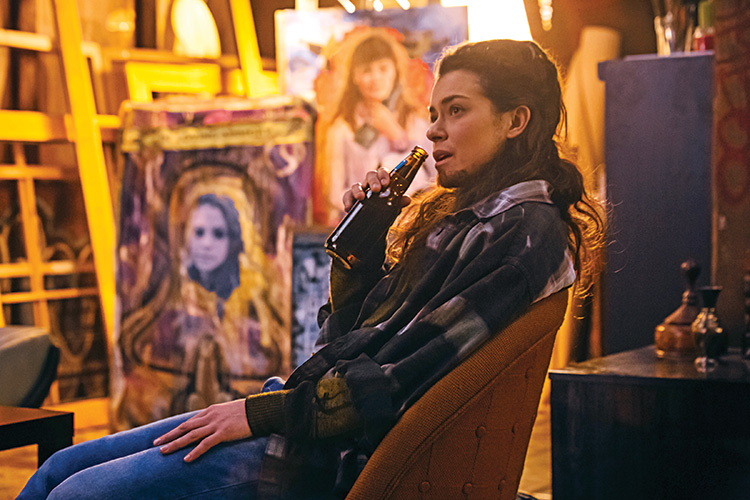
Which isn’t to say that she doesn’t feel the weight of carrying a big-budget show on her petite shoulders. When she heard she got the role, she went for a run in the rain, with Nicki Minaj in her headphones. “I was just pounding the pavement, so excited and shocked, and then it sunk in, and I was like, How am I going to do this? I can’t do this. There is no way. I’d never led a series before either, so that was scary. I still have days where I’m like, I don’t know how I’m even going to do this, but it’s fun to have that sense of not knowing.”
During the first gruelling season, Maslany would flip from clone to clone in a single day, which required hours in hair and makeup, while her dialect coach tailed her, making sure cockney didn’t slip into Ukrainian or German. She made playlists for each clone so she could dance her way into character: The Clash for London-born Sarah; Tom Waits for disturbed Helena. (Fans love this behind-the-scenes tidbit so much, Maslany gamely offered up her clone song lists online.) In an effort to preserve the sanity of their star, however, the creators now try to film one or two clones per day. Still, the show is a life-consuming commitment. The week after we meet, she pulls out of an Off Broadway production of Neil LaBute’s The Way We Get By (Amanda Seyfried replaced her) because the third season of Orphan Black is running over schedule.
That she’d choose to spend her hiatus in a two-person Off Broadway play gives you some insight into her career priorities. “I never wanted fame. I’ve never sought it out,” she says sharply. “I struggle with the whole awards idea. It feeds into this thing that I never thought to be a part of or felt a part of. I just want to work with good directors and cool characters.”

That’s one reason she agreed to work on Woman in Gold with Simon Curtis, the director who helped transform Michelle Williams into Marilyn Monroe in My Week With Marilyn. Curtis is a fan of the show and happened to meet her through Cullen during one of her visits to London (the two do long-distance). I call Curtis to talk about working with Maslany, and he gushes: “She is incredibly versatile. She runs, she speaks German, her acting is incredibly sensitive and intuitive.”
The film is based on the true story of Maria Altmann, a Viennese Jew who fled to Los Angeles after the Nazis seized her family’s art collection, which included a famous gilt Gustav Klimt painting of her aunt. Helen Mirren plays the present-day Maria who attempts to reclaim the stolen painting, while Maslany portrays her younger counterpart in a series of flashbacks set in the ’40s. On first glance, the two look nothing alike, but seeing Maslany’s determined gait mixed with her delicate gestures, you realize the casting is inspired.
After Orphan Black, Fawcett sees Maslany anchoring major blockbusters; at press time, she’s rumoured to be screen-testing for a role in the new Star Wars movie. She’s also started shooting the complete opposite of a mega-franchise: Two Lovers and a Bear, a Quebec-made romance in which she and Dane Dehaan (a.k.a., Green Goblin in The Amazing Spider‑Man 2) fall in love in a small town near the North Pole. Maslany is adamant about not being pigeonholed. “I never want to be one thing. As an actor, I never want to be the girl who was that. Which is why Orphan Black is so exciting. I’m never going to be typecast because I get to play all of these different characters.”
I take this as my cue to ask about the many Strong Female Characters available to actresses her age right now, and she very swiftly, very kindly corrects me: “I think the scripts for strong women have been warped into this idea of strong women as unemotional, in power suits—a kind of men. Or they acquire masculine qualities in order to mask the feminine qualities.” Her dream role would look something like Gena Rowlands in A Woman Under the Influence, the 1974 John Cassavetes film that features Rowlands as a housewife of questionable mental health status. “She is so unwilling to be defined by her gender. She’s ugly, funny, weird, vulnerable, very needy. She goes everywhere with no fear. I find fearlessness—which doesn’t mean not being scared; it’s like you’re scared, but you still go—those are the characters I’m interested in. I think strength is being able to reveal the grossest sides of yourself without apology and without a wink to the audience or fear of being ugly. That, to me, is strength.”
Hair: Liliane Salloum, Tresemmé Hair Care, Judyinc.com.
Makeup direction: Eddie Malter, official makeup artist for L’Oréal Paris in Canada.
Makeup: Sabrina Rinaldi, P1M.ca.
Nails: Leeanne Colley, Tips Nail Bar, P1M.ca.
Props: Caroline Pandeli, Plutino Group.
Read the rest of our April issue NOW on Next Issue, or find it on newsstands March 16!








